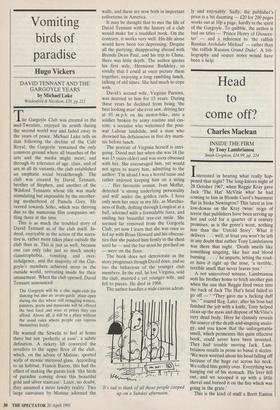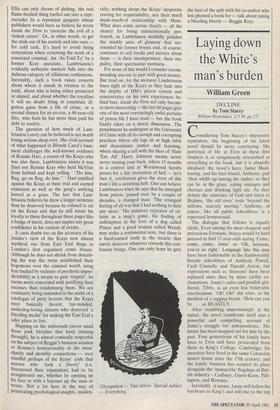Head to come off?
Charles Maclean
INSIDE THE FIRM by Tony Lambrianou Smith Gryphon, £14.99, pp. 224 Interested in hearing what really hap- pened that night? The long-knives night of 28 October 1967, when Reggie Kray gave Jack 'The Hat' McVitie what he had coming to him in Blonde Carol's basement flat in Stoke Newington? This latest in low low-downs on the Kray twins' reign of terror that publishers have been serving up hot and cold for a quarter of a century promises, as is the genre's wont, nothing less than the 'Untold Story'. What it delivers . . . well, at least you won't be left in any doubt that author Tony Lambrianou was there that night. 'Death smells like something singeing, like hair and blood burning . . . ,' he imparts, letting the read- er have it right up the nose, 'a terrible, terrible smell that never leaves you.'
A not uninvolved witness, Lambrianou sent his brother home to fetch another gun when the one that Reggie fired twice into the back of Jack The Hat's head failed to go off — ' "They gave me a fucking duff 'un,' " roared Reg. Later, after his boss had finished the job with a knife, Tony helped clean up the mess and dispose of McVitie's very dead body. Here he clumsily reveals the source of the death-and-singeing analo- gy, and you know that the unforgettable smell, which permeates this quite effective book, could never have been invented. They had trouble moving Jack, Lam- brianou recalls in prose so banal it sizzles: 'We were worried about his head falling off because of the huge cut across his neck. We rolled him gently over. Everything was hanging out of his stomach. His liver fell out, and we scooped it up with a little shovel and burned it on the fire which was going in the grate.'
This is the kind of stuff a Brett Easton Ellis can only dream of dishing, the real flame-broiled thing barfed out into a tape- recorder by a repentant gangster whose publishers would have us believe he wrote Inside the Firm to 'exorcise the evil of a violent career'. Or, in other words, to get the stink out of his nostrils and into ours for cold cash. It's hard to avoid being sententious when reviewing the work of a convicted criminal. An `As-Told-To' by a former Kray associate, Lambrianou's evidently authentic memoir falls into the dubious category of villainous confessions. Inevitably, such a book raises concern about where it stands in relation to the truth, about who is being either protected or slimed, and about whether the royalties it will no doubt bring in constitute ill- gotten gains from a life of crime, or a second chance for an ex-con, a 48-year-old lifer, who feels he has more than paid his debt to society.
The question of how much of Lam- brianou's story can be believed is not worth losing serious sleep over. His vivid account of what happened in Blonde Carol's base- ment challenges the well-known evidence of Ronnie Hart, a cousin of the Krays who was also there. Lambrianou insists it was Hart not Ronnie Kray who held McVitie from behind and kept yelling "Do him, Reg, go on Reg, do him." ' Hart testified against the Krays at their trial and earned remission as well as the gang's undying hatred as a grass. The fact that Lam- brianou believes he drew a longer sentence than he deserved because he refused to rat on the Krays and that he still wears his loyalty to them throughout these pages like a badge of merit, does not inspire any great confidence in his version of events.
It casts doubt too on the accuracy of his insider's view of the Krays now almost mythical rise from East End thugs to London's first organised crime bosses. Although he does not shrink from describ- ing the way the twins established their hegemony over the criminal world, using fear backed by violence of psychotic unpre- dictability as a means to gain 'respect', he seems more concerned with justifying their excesses than condemning them. We are constantly being reminded in the midst of a catalogue of petty horrors that the Krays were basically decent, fair-minded, underdog-loving citizens who deserved 'a bleeding medal' for making the East End a safer place to live.
Slapping on the whitewash (never mind those pink blotches that keep staining through), he is almost comically respectful on the subject of Reggie's business acumen or Ronnie's homosexuality or the twins' charity and showbiz connections — ever mindful perhaps of the Krays' code that anyone who 'took a liberty' (i.e. threatened their reputation) had to be straightened out, whether by opening up his face or with a bayonet up the anus or worse. Not a lot here in the way of penetrating psychological insights, inciden- tally; nothing about the Krays' desperate craving for respectability, nor their much made-much-of relationship with Mum. What does come across clearly — all the clearer for being unintentionally por- trayed, as Lambrianou wistfully polishes the muddy aura of glamour that sur- rounded his former bosses and, of course, continues to sell books and movies about them — is their incompetence, their stu- pidity, their spectacular nastiness.
For none of this would I consider recom- mending anyone to part with good money. But read on, for the moment Lambrianou loses sight of the Krays as they fade into the depths of HM's prison system and concentrates on his own experiences be- hind bars, Inside the Firm not only becom- es more interesting — the last 60 pages give one of the most convincingly awful pictures of prison life I have read — but the book finally takes on a moral dimension. The punishment he undergoes at the University of Crime with all its corrupt and corrupting practices where old lags sit at high table and disseminate justice and learning, where sharing a cell with the likes of 'Hate 'Em All' Harry Johnson means never never turning your back, where 15 months in a control unit at Wormwood Scrubs passes for a fair recreation of hell — let's face it, retribution gives the story of this man's life a satisfying heft. One can believe Lambrianou when he says that he emerged from prison, passed over by a couple of decades, a changed man: 'The strangest feeling of all was that I had nothing to hate any more.' His statutory rejection of vil- lainy as a mug's game, his finding of redemption in the love of a dog called Prince and a good woman called Wendy may strike a sentimental note, but there is a hard-earned truth in the treacle that surely deserves whatever rewards this con- fession brings. One can only hope he gets
'Occupation — Taxi driver. Special subject — Everything.'
the best of the split with his co-author who last ghosted a book for — talk about taking a bleeding liberty — Reggie Kray.



























































 Previous page
Previous page